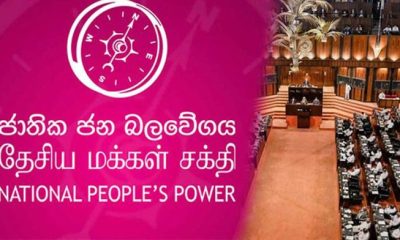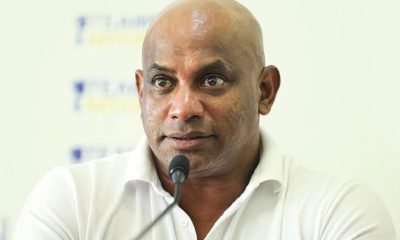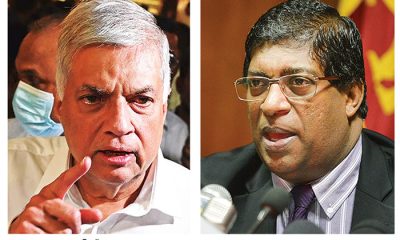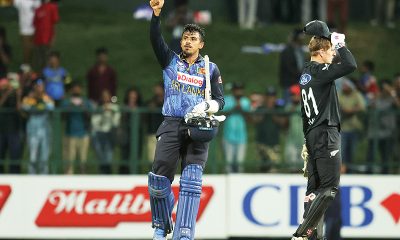Editorial
‘Prosperity and Splendour’

Thursday 10th June, 2021
It is now clear that the government will import hundreds of luxury vehicles, costing billions of rupees, for the MPs while the country is struggling to procure vaccines, and medical equipment to save lives, and many people are crying out for financial assistance. How the hapless masses feel when their well-fed, contented representatives zip past them in flashy vehicles is anybody’s guess.
The government continues to contradict itself. A few weeks ago, it said it had decided against importing luxury vehicles at the instance of Prime Minister Mahinda Rajapaksa, who is also the Minister of Finance. Previously, it said it had been left with no alternative but to impose import restrictions because foreign reserves had to be shored up. But it does not give a tinker’s cuss about the country’s foreign exchange woes when the beneficiaries of luxury imports happen to be influential politicians. It has fulfilled its prosperity-and-splendour promise, where the MPs are concerned.
Yesterday, our main news item quoted Media Minister and Government Spokesman Keheliya Rambukwella, as having said in a television interview that now it was not possible to cancel the controversial vehicle imports as letters of credit had already been opened. It is doubtful whether anyone will buy into this claim. No sooner had this government been formed than it cancelled a Japanese-funded Light Rail Transit project worth USD 2.2 billion regardless of the consequences of its action. So, the argument that it is now too late to cancel the luxury vehicle purchases does not hold water. Will the government explain why it ever decided to spend about Rs. 4 billion on vehicle imports unnecessarily amidst the raging pandemic, in the first place?
Strangely, the Opposition, which picks holes in everything the government does, and demands that wasteful expenditure be curtailed and more funds allocated for the country’s fight against the pandemic, is silent on the vehicle imports. Some of its members recently claimed they were not aware of the government decision to import luxury SUVs for the MPs! But they claim to be privy to even what the government politicians do on the sly.
Now that the patriotic members of the Opposition have been informed that the cash-strapped government is wasting public funds on importing vehicles for the MPs, what will be their reaction? Will they refuse to accept the vehicles to be imported? It may be recalled that they refused to be inoculated against Covid-19, saying the people should be given the jab first. When they said so, we asked them whether they would forgo duty free vehicles as well. Let that question be repeated.
It will be interesting to see the reaction of the Opposition, especially the SJB and the JVP. Will they call upon the government to cancel luxury vehicle imports? After all, during the yahapalana government, they even cancelled an aircraft purchase agreement. So, they should be able to pressure the government to stop importing vehicles, and if their call goes unheeded, they must say no to the SUVs, etc., being imported for them. The time has come for them to prove their claim that they really feel for the public unlike the government.
Meanwhile, the political leaders who bellow patriotic rhetoric, claiming to have made a tremendous contribution to what they call the development of the country, unashamedly beg for assistance whenever they meet foreign leaders or envoys. They also puff out their chests and beam from ear to ear when they pose for pictures with the donors handing over aid.
Begging has evolved into an industry of sorts in this country. Some shameless racketeers exploit poor children and adults with various disabilities and diseases to move the public to donate money, which they use to feather their own nests. They have amassed enormous amounts of wealth at the expense of the poor. One does not see any difference between these beggar mudalalis and the politicians who exploit the suffering of the poor to raise funds.
Editorial
Lesson from NL battles

Saturday 23rd November, 2024
The ‘Gas Cylinder’ (New Democratic Front-NDF) has exploded and the ‘Telephone’ (SJB) is in a tangle over the National List (NL) appointments, and it is likely to take longer than expected for them to name their NL MPs. They are full of ambitious members vying for the NL slots.
The SJB had been able to appoint only its General Secretary Ranjith Maddumabandara as an NL MP at the time of writing. The UNP-led NDF secured two NL slots in the 14 November general election, and Ravi Karunanayake is drawing heavy flak from the UNP for having had himself appointed to Parliament arbitrarily.
The UNP is flaying NDF General Secretary Sharmila Perera for having acted high-handedly in appointing her friend, Karunanayake, to Parliament, but there is hardly anything it can do about the appointment at issue; Karunanayake was sworn in as an MP on Thursday; he and Perera have denied any wrongdoing. How the UNP is going to tackle the issue remains to be seen.
The ongoing fierce scramble for NL positions in the Opposition vindicates the JVP-led NPP’s criticism of its political rivals as a bunch of power-hungry politicians driven by self-interest; it may also explain why the SJB and the UNP/NDF have lost popular support over the years. Neither the JVP nor its alter ego, the NPP, has experienced intraparty disputes over NL appointments. The JVP has total control over its candidates, and this is something to be admired.
The NPP too has incurred public opprobrium for the shameful act of appointing defeated candidates to Parliament as NL MPs. However, to give credit where it’s due, overall, the conduct of the JVP/NPP in elections has been commendable and worthy of emulation. Never do the JVP/NPP candidates fight over preferential votes; they put their party before self. The JVP once did something that no other party would have been able to do.
One may recall that the JVP, after the election of 41 out of about its 55 candidates fielded on the SLFP-led UPFA’s ticket in the 2004 parliamentary polls, ‘donated’ two its NL slots to the SLFP to help the then President Chandrika Bandaranaike Kumaratunga settle a dispute in the SLFP over the allocation of NL seats. Those who are fighting over NL positions in other parties will have to learn to make sacrifices for the sake of their parties and coalitions if they are to win back public sympathy and recover lost ground.
Meanwhile, the controversy over the NDF’s NL appointment offers a lesson that should not go unlearnt. It shows that under the existing election laws, the general secretaries/leaders of political parties are vested with enormous powers which they must not be allowed to exercise according to their whims and fancies.
Therefore, the preferential vote or manape must never be abolished. Otherwise, the general secretaries/leaders of political parties will be able to appoint their favourites whose names appear on nomination lists to Parliament at the expense of the deserving ones, depending on the number of seats they are entitled to on the basis of the Proportional Representation.
There has been a sustained campaign for doing away with the preferential vote mechanism, which is made out to be a wellspring of evil. True, candidates clash over preferential votes and their fights lead to transgressions including incidents of violence, but the fault is not with manape but the failure of weak political party leaders to rein in their unruly candidates and supporters. If only decent candidates are fielded and the law is strictly enforced, clashes over preferential votes can be dealt with effectively. The recently concluded general election was free from serious incidents of violence, wasn’t it?
The NPP administration gave the police a free hand to enforce the law, and the Election Commission warned that transgressors would lose their seats while taking action against the candidates who violated election laws. If the law can be enforced in this manner, future elections will also be peaceful, free and fair.
Editorial
Sign of capitulation

Friday 22nd November, 2024
Leaders of all previous governments, including those who provided political leadership for defeating the LTTE, shamefully failed to tame the rice millers’ Mafia; they took on the latter only to beat retreats with their tails between their legs. The signs are that the NPP leaders will fail to be different. They, too, have decided to import rice, unable to make a handful of large-scale millers release hoarded rice to the market.
The JVP-led NPP government is in overdrive to trace illegally assembled vehicles and have their owners arrested and prosecuted—and rightly so. It has already netted some Opposition politicians with such vehicles. It must go the whole hog to put an end to this racket, which has deprived the state coffers of a great deal of tax revenue. Curiously, it has baulked at going all out to trace illegally hoarded paddy. President Anura Kumara Dissanayake himself said at a public rally in Polonnaruwa, last month, that there was no countrywide rice shortage and ruled out the possibility of importing rice.
It has been reported that Duminda Priyadarashana, a senior agriculture economist attached to the Hector Kobbekaduwa Agrarian Research and Training Institute, informed President Dissanayake at a meeting, last month, that the country had sufficient rice stocks, according to the Agriculture Department database, and there was no need for rice imports. He rightly pointed out that rice shortages occurred whenever millers were asked to adhere to the prices stipulated by the Consumer Affairs Authority (CAA). Minister of Trade and Commerce, Food Security and Cooperative Development Wasantha Samarasinghe and NPP MP and National Organiser of the All Ceylon Farmers’ Federation, Namal Karunaratne, have also confirmed that the country has sufficient rice stocks. Thus, it is clear that the large-scale millers have created an artificial shortage of rice to jack up prices. It defies comprehension why the government has chosen to import rice.
What the NPP government, which came to power promising stringent action against those who exploit the public, should do is to order that the illegally hoarded paddy be traced and milled to make rice freely available to the public at reasonable prices. One wonders whether the ‘maroon wave’, which swept across the country last week, making the NPP’s political rivals head for the hills, has stopped at the silos of powerful millers. Why can’t the government with a two-thirds majority take on the millers’ Mafia and tame it? Importing rice, as a solution to the hoarding of paddy, is not only absurd but also indicative of a humiliating capitulation of the government to the powerful millers.
One can predict what will happen to most of the rice to be imported. The millers’ Mafia will increase the supply of locally produced rice to the market, bringing prices down; it can afford to do so because its members have already made enough profits by exploiting farmers and consumers. Rice varieties imported by governments do not appeal to Sri Lankan palates, as is public knowledge; they are likely to remain unsold and end up as animal feed. The powerful millers usually play this trick in time for the commencement of a harvesting season so that they can cause the paddy prices to fall and fleece the rice growers, but this time around they are likely to do so earlier to wrong-foot the government.
The government, we repeat, must not import rice since the rice scarcity is due to hoarding. The solution is to handle the large-scale rice millers with a firm hand and ensure that they obey the law. Let the NPP be urged to grasp the nettle.
It is hoped that the leaders of the new government are not beholden to the wealthy millers, unlike their predecessors who benefited from the largesse of the unscrupulous rice mudalali fraternity at the expense of consumers and farmers.
Editorial
Draining Diyawanna swamp

Thursday 21st November, 2024
The JVP added Sinhala slang, jilmaat, meaning trickery, to Sri Lanka’s political lexicon, after the 2010 presidential election; it claimed that the then President Mahinda Rajapaksa had secured a second term by means of a computer jilmaat, but it could not prove that allegation. However, there have been numerous instances of legislative and constitutional jilmaat in this country, and they are responsible for the rapid rise of anti-politics. Veteran leftist and former Cabinet Minister D. E. W. Gunasekera has, in a brief interview with The Island, pointed out how a questionable constitutional amendment has been gnawing away at public trust in the electoral process since 1989.
A report in this newspaper yesterday quoted DEW as having said that the 14th Amendment, which inserted Article 99A into the Constitution, in 1988, providing for the appointment of defeated candidates as National List (NL) MPs, was different from the original Bill approved by a Parliamentary Select Committee (PSC). He has said the then Prime Minister Ranasinghe Premadasa, who headed the PSC at issue, himself revealed that fact during a parliamentary debate, but no remedial action was taken.
The deplorable practice of appointing defeated candidates to Parliament is violative of the people’s franchise, and a Bill containing such provision would not have survived judicial scrutiny, and therefore it is possible that the J. R. Jayewardene government resorted to some constitutional jilmaat to secure the passage of the 14th Amendment with the questionable section.
No government has cared to amend Article 99A in spite of their much-avowed commitment to democratic best practices. All political parties have shamelessly used this constitutional provision to smuggle in defeated candidates into Parliament. As long as Article 99A remains unchanged, it will not be possible for the people to get rid of any MP by defeating him/ her in a general election if he/she is in the good books of his/her party leader and his/her party polls enough votes to secure NL slots. Even the JVP-led NPP, which pontificates ad nauseam about democracy, morals and ethics, has appointed defeated candidates as NL MPs. Two of its 159 members in the new Parliament are candidates rejected by the people in last week’s election. The New Democratic Front is embroiled in a dispute over its two NL slots which a large number of its defeated candidates are said to be eyeing.
It is also possible for political party leaders to engineer NL vacancies to appoint anyone of their choice as an MP owing to Section 64 (5) of the Parliamentary Elections (Amendment) Act passed in 1988. All political parties have made use of this despicable legal provision to make NL appointments. Such reprehensible laws have come to stay because once they are ratified by Parliament, they become faits accomplis owing to the absence of legal provision for the post-enactment judicial review of legislation, the need for which cannot be overstated in a country like Sri Lanka, where governments do not respect even the entrenched clauses in the Constitution. It may be recalled that in January 2024, the Rajapaksa-Wickremesinghe government, which bulldozed its way through, arbitrarily declared that its draconian Online Safety Bill had been passed amidst a noisy protest in the House. In 2017, the Provincial Council Elections (Amendment) Bill was passed in a questionable manner, with some sections incorporated into it at the committee stage to postpone the PC polls on the pretext of increasing female representation. It was a typical Christmas Tree Bill, which was substantially different from the Bill gazetted, tabled in Parliament and examined by the Supreme Court. Sadly, yet unsurprisingly, all political parties represented in Parliament at the time voted for that bad Bill, enabling its passage with a two-thirds majority!
The onerous task of draining the Diyawanna swamp, which the NPP has undertaken to perform, should not be limited to ridding the legislature of undesirables; Parliament must also be made to right the wrongs it has committed under previous governments if public trust therein is to be restored. Let the NPP government be urged to use its supermajority to amend Article 99A and Section 64 (5) of the Parliament Election Act as a national priority to prevent the appointment of defeated candidates and those who are neither unsuccessful candidates nor NL nominees as MPs. Similarly, urgent action should be taken to enable the post-enactment judicial review of legislation. That is the least the self-righteous JVP/NPP leaders can do to atone for the sin of having appointed defeated candidates as NL MPs. No clean-up of Parliament will be complete unless the new government takes action to safeguard the people’s franchise, which is the bedrock of democracy.
-

 Life style7 days ago
Life style7 days agoKing of coconuts heads for a golden future
-

 News6 days ago
News6 days agoNPP appoints two defeated candidates as NL MPs
-

 Sports2 days ago
Sports2 days agoPathum will become world’s best batter, says Jayasuriya
-

 News5 days ago
News5 days ago‘Gas Cylinder’ explodes; Ranil flays NDF Secy. for submitting Ravi’s name
-

 Midweek Review4 days ago
Midweek Review4 days ago‘Ramayanizing’ Sri Lanka by Courtesy of SriLankan Airlines
-

 Sports5 days ago
Sports5 days agoMaking batting compulsory for bowlers has worked – Theekshana
-

 Editorial7 days ago
Editorial7 days ago‘Twas a great victory
-

 Sports3 days ago
Sports3 days agoSri Lanka’s cricket revival continues











